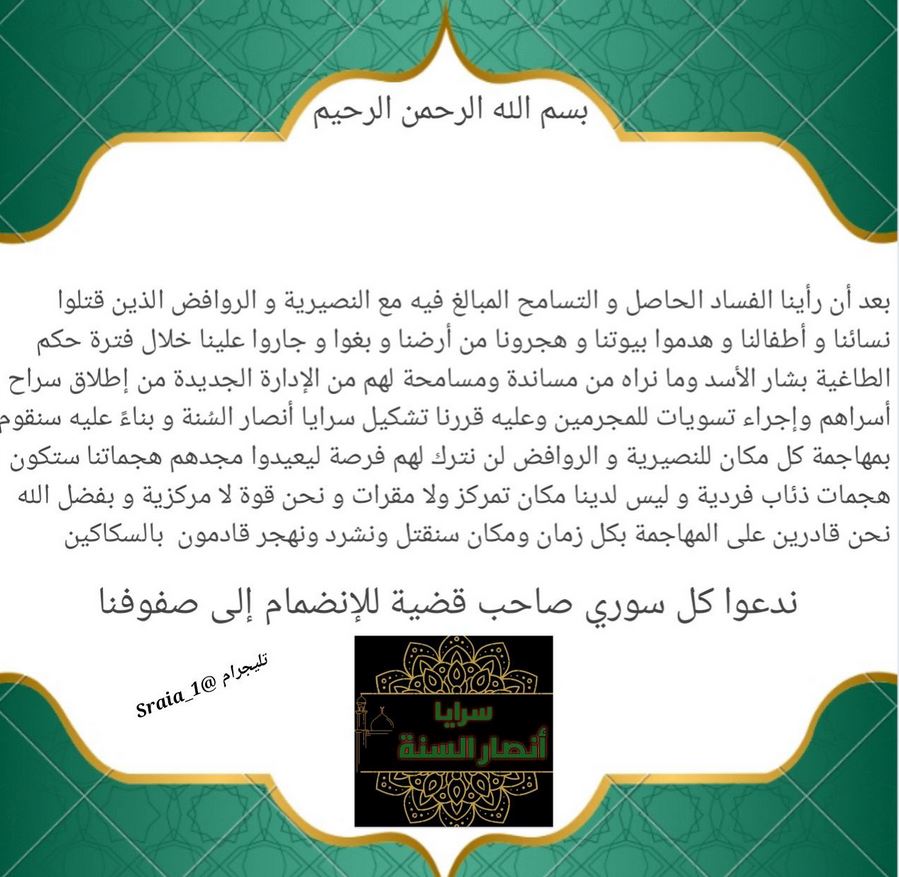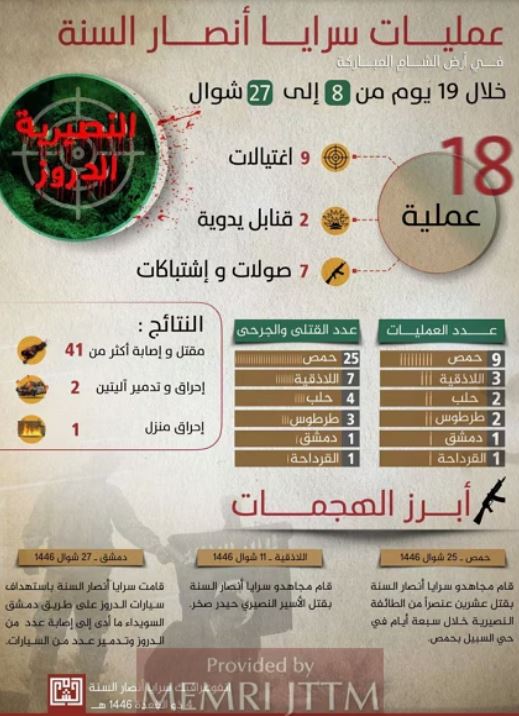The Syria-based jihadist group Saraya Ansar al-Sunnah has announced that it will cease its military-related media activities, but warned that it will continue to carry out attacks against “infidel” minority communities in Syria. The group, which emerged in late January, has claimed responsibility for several attacks and assassinations targeting Syrian Alawites, Assad loyalists and Druze minorities. The jihadist group made the announcement via its media arm al-Adiyat, on its dedicated Telegram channel on 19 May. It did so in a two-page statement that was attributed to the group’s “general command” and also dated 19 May. The statement was not explicit as to why it would be withholding military-related messaging from now on.
The decision to helt military media output may be related to concerns about compromising the group’s operational security of effectiveness. Earlier in May, the group claimed to have “eliminated’ 13 individuals who were monitoring their online activities.
Group Background
Saraya Ansar al-Sunnah’s ideology is rooted in Salafist-jihadist rhetoric, similar to that of the Islamic State (IS). The group has stated that its priority is to purge Syria of “apostate sects”, including Alawites, Druze, Shiites, and the Kurdish-led Syrian Democratic Forces (SDF).

The group’s leader, Abu Aisha al-Shami, and its senior sharia official, Abu al-Fath al-Shami are believed to be the main driving forces behind the group’s ideology and strategy. The group operates largely through encrypted platforms like Telegram, issuing communiques, ideological tracts and threats via multiple affiliated channels.
Despite its growing notoriety, Saraya Ansar al-Sunnah remains organizationally ambiguous with no known headquarters and members scattered across Syria’s rural areas. The group’s secrecy has led to speculation that it may be a fabrication or a proxy used by unknown actors to stir sectarian tensions. This has drawn comparison from some quarters to the regime-era shabbiha militias – forces used to do the regimes’s dirty work while maintaining plausible deniability.

Expansion into Lebanon
In one of its most-high profile announcements, the group claimed it was preparing to expand operations into Lebanon, citing its growing presence near the border and a desire to “confront apostates” in Tripoli and elsewhere. This has raised some concerns about the group’s potential to pose a security threat not only to minorities but also to any vision of inclusive, democratic recovery in Syria.
Academic insight
Former Syrian parliment member and Islamic researcher Mohammed Habash has explained that the name “Ansar al-Sunnah al-Muhammadiyah” originated in Egypt about a century ago as a religious movement concerned with implementing Islam. However the group’s recent emergence in Syria has been marked by an extremist role, rejecting the new state’s orientation toward building a civil state and balanced relations with Arabs and Muslims.
Habash emphasized the need for the state to fulfill its duty to stop any threat posed by group like Saraya Ansar al-Sunnah, which are directing successive threats against members of the Syrian people. Habash suggested “groups within the organization played an extremist role, rejecting the new state’s orientation toward building a civil state and balanced relations with Arabs and Muslims. This organization believes that the responsibility of the Islamic Revolution requires it to fight polytheists, especially those who follow esoteric doctrines that Salafi jihadism considers infidels, particularly the Alawite, Druze and Ismaili sects. The group’s ideology is considered a hardline Salafist ideology that is unpopular among Sunni Muslim jurists and is even unacceptable to the new state. There is no doubt that these orientations contradict the Islamic values of mercy.
Concerns about the veracity of the groups attack claims
The “Ramadan Harvest” report published by Saraya Ansar al-Sunnah in late March provided a distrubing example of the group’s violent ideology and tactics. The report lists dozens of operations including:
- Executions of Alawites and arson attacks on their villages
- Destruction of shrines in Hama and Homs
- Bombings in mixed neighbourhoods

The groups stated goal of replacing minorities with “true Sunnis” is a form of ethnic cleansing, itself a serious violation of international law and human rights. Their operational capabilities is debatable, some alleged victims and operations have been proven false or unverified, undermining their credibility.
Regardless of this, it would appear that their ideology is rooted in a deep-seated sectarianism and intolerance.

